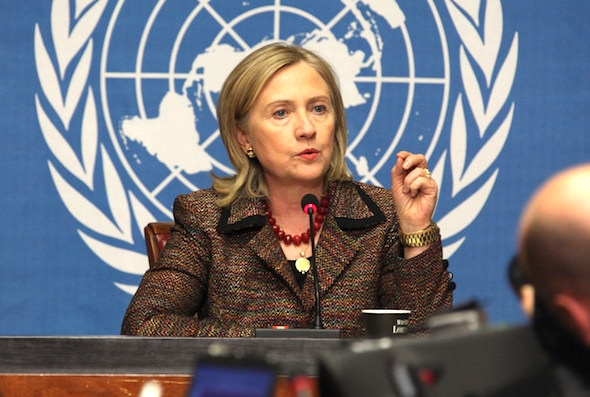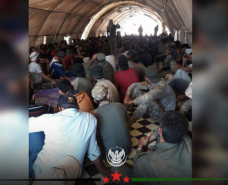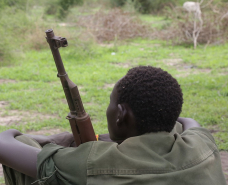Hillary Clinton’s State Department Let South Sudan Use Child Soldiers
Submitted by Gary on Sun, 12/06/2016 - 04:05

Hillary Clinton spent years vowing to defend the rights of children worldwide, but under her leadership the State Department played a central role in allowing rebel forces in southern Sudan to use child soldiers in defiance of a 2008 law forbidding it, reports Nick Turse at The Intercept.
The law is called the Child Soldiers Prevention Act, or CSPA, and after South Sudan’s independence, in 2011 the White House issued annual waivers that kept taxpayer dollars flowing its way despite its use of child soldiers.
In 2012, Clinton railed against “modern-day slavery” in the introduction to a State Department report on human trafficking targeting the “unlawful recruitment or use of children” by militants. However, she does not appear to have publicly explained her role in allowing South Sudan and other countries to receive military support while using children as combatants. In fact, the State Department played what Turse describes as “a central role” in issuing the controversial waivers, according to two sources, one of whom is a former State Department official.
Turse continues:
As a presidential candidate, Clinton has made her foreign policy experience a centerpiece of her campaign. Under scrutiny, however, Clinton’s acumen has been consistently called into question — from her vote, as a U.S. senator, for the Iraq War (which led to the collapse of that country into near failed-state status) to her relentless push to intervene in Libya (which led to the collapse of that country into near failed-state status); not to mention her handling of the Russian “reset,” the so-called pivot to Asia, and the Arab Spring, among other issues.
Until now, however, there has been little of mention of Clinton’s handling of South Sudan. With strong U.S. support, South Sudan became an independent country while she was secretary of state — and soon spiraled into a disastrous civil war that involved large numbers of child soldiers. The CSPA waivers and the broader panoply of military and diplomatic support that was extended to South Sudan and the government of its president, Salva Kiir, failed to prevent a descent into violence that has cost more than 50,000 lives and forced more than 2.4 million people to flee their homes.
At a major conference on South Sudan in 2011, Clinton spoke about “the opportunity to make it possible for [South Sudan’s] children to envision a different future.” Yet in that same year, the Obama administration used a technicality to gain a CSPA exemption for South Sudan, since the list of countries subject to the law that year was created before the new nation became independent. There would be no “different future” for South Sudan’s child soldiers in 2011, nor the next year, when the White House issued a waiver for South Sudan, as well as for now war-torn Libya and Yemen.
So what role did Clinton and the State Department play?
Daniel Mahanty, who served in the Bureau of Democracy, Human Rights, and Labor under Clinton, confirmed that the State Department, in consultation with the White House, controlled the process. The State Department drafted all waiver materials and all recommendations to the president were made on behalf of the secretary of state and with her full approval. “We will have already drafted the letter from the president to Congress that says what waivers he’s going to invoke,” Mahanty told me. “So it goes up to the secretary [of state], then over to the White House, and from the White House out to the public.”
Jo Becker, the advocacy director of the children’s rights division at Human Rights Watch, has closely followed the process behind the waivers and also believes Clinton’s State Department played a central role. “It’s the State Department that gives the recommendations to Obama on who he should waive,” she told me.
Contacted by The Intercept, key officials at the State Department at the time of the waivers did not respond to requests for comment, and Clinton’s campaign staff failed to provide information about her role. The Intercept reached out to Johnnie Carson, the assistant secretary of state for African affairs under Clinton, but he did not make himself available to speak. Other officials who did not comment include Cheryl Mills, Clinton’s chief of staff and counselor at the State Department; Jake Sullivan, formerly the director of policy planning at the State Department and deputy chief of staff to Clinton; and Karen Hanrahan, who served as deputy assistant secretary in the Bureau of Democracy, Human Rights, and Labor.
Continue reading at source: https://theintercept.com
Geographic terms:
Countering Military Recruitment

WRI's new booklet, Countering Military Recruitment: Learning the lessons of counter-recruitment campaigns internationally, is out now. The booklet includes examples of campaigning against youth militarisation across different countries with the contribution of grassroot activists.
You can order a paperback version here.
Content tagged by...
military recruitment
(204)
education
(203)
child soldiers
(118)
counter-recruitment
(100)
resistance
(99)
conscription
(87)
militainment
(47)
gender
(43)
commons
(43)
direct action
(38)
reports
(34)
Content tagged by location ...
United States of America
(188)
International
(158)
Britain
(155)
Europe
(142)
North America
(138)
Germany
(105)
Israel
(69)
Colombia
(61)
Middle East
(43)
Latin America
(42)
Africa
(31)
Spain (state of)
(29)
Asia
(26)
Venezuela
(25)
Canada
(23)








